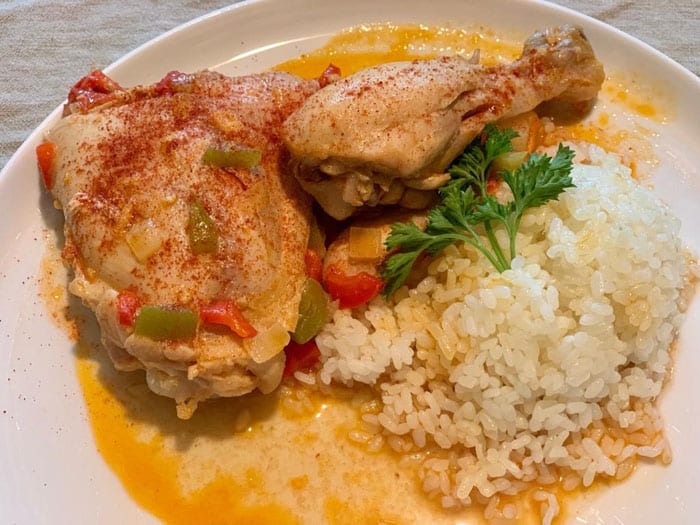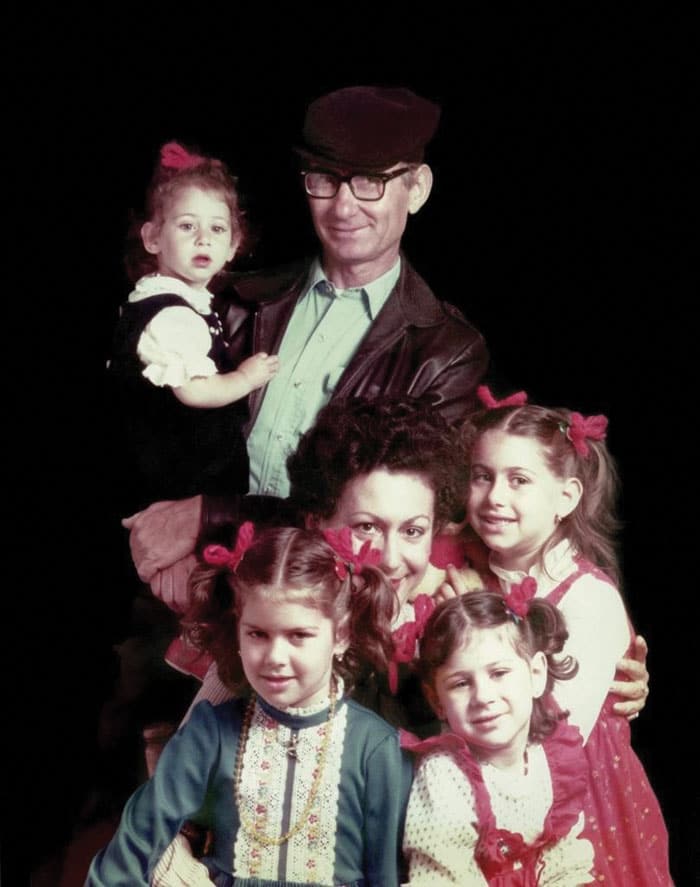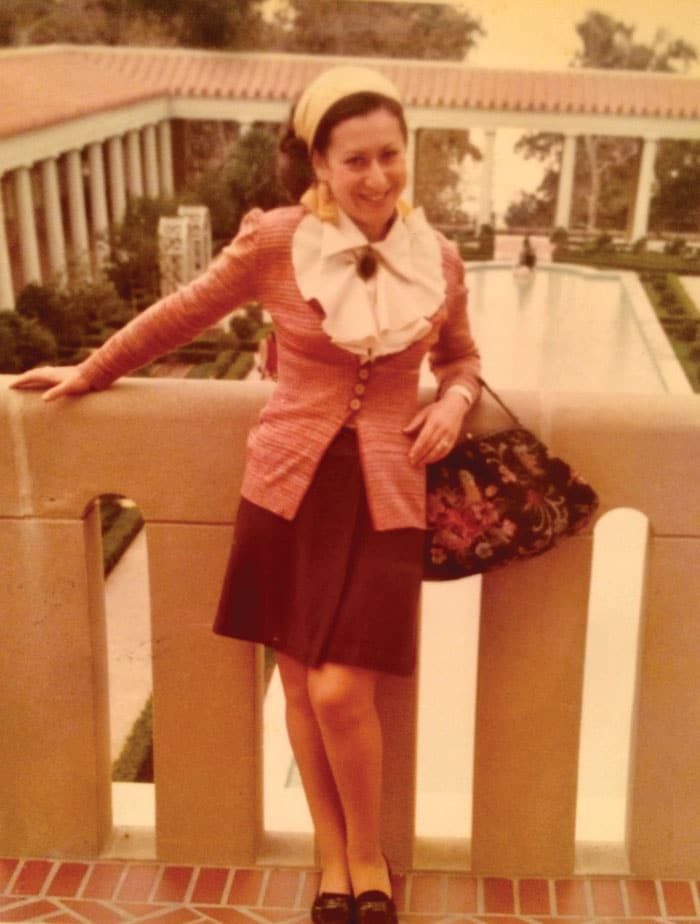 Chicken Paprika
Chicken Paprika This week Rachel and I are honored to share our column with a family friend. My younger brother Danny met Judy through a mutual friend when they both went boogie boarding as young teenagers. Over the years, Judy became part of my family. She introduced my brother Danny to her roommate Lemor. Danny and Lemor are married now.
I never had the honor of meeting Judy’s mother but I know firsthand how much her father loved her. Love like that is an inspiration.
—Sharon
Some flavors are tried and tasted for a brief moment of fancy, others last in the archive of our taste buds for a lifetime.
This story is about the latter. Specifically the alchemic connection that takes place when good food, people and conversation converge.
It’s the shared narrative of nomadic culture. The legacy of immigrants who carried food from place to place on their backs. The ancestors who trod snowy village roads from the baker’s communal oven to their small shtetl home.
It is in these “one pot wonders” that we find reflected the Jewish melting pot of many countries and many kitchens but one people.
For the reader who experienced my mother’s Hungarian kitchen first hand, your taste buds must be stirring. For those who did not, allow me to invite you in.
My three sisters and I were born into the Los Angeles Borsht Belt scene in the 1970’s and 80’s. We lived in the Fairfax area and our grandmother lived downstairs from us. She always had garlic hanging from the rafters and she often had a carp swimming in the bathtub (fresh gefilte fish).
Our home was a place where nothing from the outside world could be more important than the people who were in it. Most notably, our home was a gathering place, a place where incredibly fragrant Bohemian inspired dishes were served to anyone and everyone that walked in the door.
We weren’t a typical LA family, (I’m sure most children of immigrants can relate). We understood from a very young age that something about our home was different. It made us feel slightly ashamed and extraordinarily confident at once.
We were raised with my parents’ stories of their happier memories of Hungary. We laughed at the funny sounding Hungarian words and the absurd themes of the songs.
We heard stories about gypsy song and dance, horse-drawn carriage rides between villages and street vendors selling roasted chestnuts.
We learned that only rich children got oranges for snack or a penny to buy a cookie at the local bakery. And that people actually stomped grapes by foot to make wine!
The one common string that connected my Mother’s “fancier” city upbringing in Budapest and my Father’s provincial village life in Debrecen, it was the warmth and beauty of Shabbat. If there was scarcity during the week, there was abundance on Shabbat. If there was brutal cold outside, there was a warm glow within on Shabbat. If there were plain clothes every day, there were special clothes reserved for Shabbat. Above all, on Shabbat, the home was a palace and they celebrated like kings and queens.
The fun stories of our families past were tragically cut short. My parents both survived the horrors of the Shoah and the communism that followed; their early years were spent more in turmoil than in joy.
My Mother and her twin sister Judy (my namesake) were born in 1943 and hidden as babies in the Budapest Ghetto under very difficult conditions.
My Father was 14 years old when he, his Mother and siblings were carted off in cattle wagons to Auschwitz.
My grandfather, an officer in the Hungarian army, was captured by the Russians and sent to slave labor in Siberia. He and my were father were the only ones to return.
My Father was raised as a Satmar Hassid. But after the war, he gravitated towards the secular Zionist youth movements (Shomer Ha’Tzair). My Mother, who came from a traditional home, leaned deeper into a more spiritual and religious life.
My mother’s three older sisters, Edie, Ilona and Eva, survived and fled Hungary immediately after the war. Through their generosity, the remainder of my Mother’s family were able to escape by foot during the Hungarian Revolution. They made their way to Los Angeles, where my young, teenaged Mother worked to help her family stand on their feet. She was very bright and a fast learner. Over the years, she held Executive Assistant positions for the CEO’s of iconic companies and industries.
My Father survived some of the most notorious Nazi camps, including Auschwitz, Dachau and Muhldorf. After the war, he set his sights on the newly established State of Israel, exchanging his striped pajamas and yellow star for khakis and heavy artillery. He gallantly defended his new homeland during the Sinai Campaign of 1956, the Six Day War of 1967 and the Yom Kippur War in 1973.
I can say with certainty that he literally “paved the roads” to build the country as we know it today. Next time you travel to Eilat, know that the road you travel was one of the many projects he took on between battles in the then unpaved desert land. If you happen to have an ice cream at Witman in the town center of Netanya, know that it is the very same ice cream parlor my Father established in the 1960’s.
The meeting of my parents was serendipitous. While on vacation in Los Angeles, my Father was directed to a Hungarian home that welcomed travelers for Shabbat meals. My Grandmother served the very same meal I’m sharing in this article. But my Father was tempted by something other than the food. He was instantly smitten by the young lady at the table. Within two weeks he asked for her hand and married her. Yes, you read that right — met, dated and married within two weeks!

This savory Hungarian dish is much like their story and very much like the loving home my parents, Margaret and Joshua Kaufman, built together — surprising, colorful, tasteful and unforgettable!
This dish feels hearty and light at the same time. It is picante and subtle, multi-sensory in texture and unforgettable in flavor. Enjoyed by royalty and peasants alike, it can be found on any Hungarian table. Orthodox Jews modified the original recipe which includes dairy. I substitute the traditional dumplings (nokedli) with potatoes.
My sisters and I grew up loving the flavors. We would lick our plates and our friends laughed at first. Then they tasted it and ate voraciously. This dish brought my family together for generations. It has created new family members at our table.
Before I share the recipe, let me say to all the Hungarians reading—I know your “Paprikash Chirke” is better than mine and certainly more authentic. Of all my mother’s handwritten recipes, I couldn’t find this one. But I know it by heart—a fine starting point for all things good!
 I would like to leave the reader with one last impression—more important than the recipe for the food is the recipe for the Hachnasat Orchim (hospitality) that my parents performed so fervently and so lovingly.
I would like to leave the reader with one last impression—more important than the recipe for the food is the recipe for the Hachnasat Orchim (hospitality) that my parents performed so fervently and so lovingly.
Just like the stranger that showed up at my Grandmother’s door (my Father) looking for a place for Shabbat; so too my parents never turned a guest away nor did they let anyone who came for a visit leave hungry. At our table people met and married, made memories, created connections, cried, laughed, sang and learned.
This time last year our dear Mother passed to the next world. May the legacy of her hospitality live on through us, her four daughters.
In blessed memory of our lovely Mom, Margaret Kaufman z”l who passed from this world on the first day of Sukkot last year. May her memory be a blessing, may her kindness and generosity be an inspiration.
Chicken Paprika
3 tablespoons extra virgin olive oil, divided
2 onions, finely chopped
8-10 cloves garlic, crushed
1 red pepper, finely diced
1 green pepper, finely diced
6 Chicken Legs & Thighs, cut into 12
pieces
1/2 bunch fresh parsley
1 1/2 teaspoons salt
2 teaspoons sweet paprika
2 teaspoons granulated garlic
Jalapeño, optional
2-3 large tomatoes, finely chopped
3 large potatoes, diced
Parsley, for garnish
- In a large skillet, warm 2 tablespoons oil over medium heat. Add chicken pieces and a sprinkle of salt. Sauté chicken on each side until lightly browned. Set aside.
- Pour remaining oil in the skillet and sauté the onion for 3 to 5 minutes until translucent and slightly golden. Add the peppers and garlic and sauté for 3 to 4 minutes. Add the tomatoes and jalapeño, if using.
- Place chicken in the skillet and gently stir to mix with the vegetables. Sprinkle the remaining salt, paprika and garlic.
- Add water just below the level of chicken (the dish should be more sauce than broth) and bring to a boil.
- Add potatoes, then lower heat, cover and simmer for at least 3 to 4 hours (the longer it cooks the more flavorful it tastes).
- Serve over Basmati or Jasmine Rice.
Sharon Gomperts and Rachel Emquies Sheff have been friends since high school. The Sephardic Spice Girls project has grown from their collaboration on events for the Sephardic Educational Center in Jerusalem. Follow them on Instagram @sephardicspicegirls and on Facebook at Sephardic Spice SEC Food. Website sephardicspicegirls.com/full-recipes























 More news and opinions than at a Shabbat dinner, right in your inbox.
More news and opinions than at a Shabbat dinner, right in your inbox.